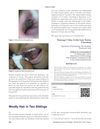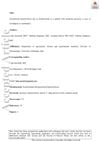 40 citations,
December 2011 in “British Journal of Dermatology”
40 citations,
December 2011 in “British Journal of Dermatology” Women's hair generally gets thinner and less dense starting in their mid-thirties, with hair loss becoming more common as they age due to both genetics and environment.
[object Object]  40 citations,
January 2003 in “Gynecological Endocrinology”
40 citations,
January 2003 in “Gynecological Endocrinology” Finasteride effectively reduces hair growth in women with polycystic ovary syndrome or idiopathic hirsutism.
 32 citations,
February 2016 in “Journal of Dermatology”
32 citations,
February 2016 in “Journal of Dermatology” Dutasteride safely promotes hair growth and reduces hair loss, with mild side effects.
 26 citations,
June 2000 in “Journal of The American Academy of Dermatology”
26 citations,
June 2000 in “Journal of The American Academy of Dermatology” Men with balding at age 45 had higher IGF-1 and lower IGFBP-3, suggesting these factors might be important in male pattern baldness.
 22 citations,
February 2002 in “Clinics in Geriatric Medicine”
22 citations,
February 2002 in “Clinics in Geriatric Medicine” Many elderly women experience unwanted facial hair and various hair loss conditions, with treatments available for each condition.
 21 citations,
October 2009 in “Biochemical Engineering Journal”
21 citations,
October 2009 in “Biochemical Engineering Journal” Stem cell therapy is a promising approach for hair regrowth despite potential side effects.
[object Object]  9 citations,
March 2016 in “Natural Product Research”
9 citations,
March 2016 in “Natural Product Research” Some flavonoids may help with hair growth by affecting blood vessel function in hair follicles.
 4 citations,
May 2002 in “Aesthetic Surgery Journal”
4 citations,
May 2002 in “Aesthetic Surgery Journal” A new hair loss classification for women improves treatment, but careful patient selection is crucial for successful hair transplantation.
 3 citations,
March 2021 in “Metabolites”
3 citations,
March 2021 in “Metabolites” Hair loss causes differ between men and women due to changes in hormone levels and inflammation-related pathways.
 3 citations,
June 2000 in “Journal of The American Academy of Dermatology”
3 citations,
June 2000 in “Journal of The American Academy of Dermatology” Men with balding at age 45 had higher IGF-1 and lower IGFBP-3 levels, suggesting these factors might influence male pattern baldness.
 1 citations,
December 2022 in “Current Issues in Molecular Biology”
1 citations,
December 2022 in “Current Issues in Molecular Biology” Annurca apple extract improved hair growth in mice and could potentially prevent hair loss.
 1 citations,
September 2017 in “Journal of Investigative Dermatology”
1 citations,
September 2017 in “Journal of Investigative Dermatology” Blocking a specific enzyme can reduce the negative impact of stress hormones on hair growth cells.
 June 2023 in “Current Issues in Molecular Biology”
June 2023 in “Current Issues in Molecular Biology” DN106212, an extract from a plant, is better at promoting hair growth than other tested substances by affecting hair growth factors and follicle development.

The document concludes that hair loss in women is complex, often linked to aging, health conditions, and nutritional deficiencies, and emotional impacts should not be underestimated.
 January 2012 in “International Journal of Trichology”
January 2012 in “International Journal of Trichology” Two siblings have a rare genetic condition causing curly, coarse hair.
 98 citations,
October 2012 in “Dermatologic Clinics”
98 citations,
October 2012 in “Dermatologic Clinics” Eating the right nutrients can improve hair health, but taking extra supplements usually doesn't help unless you have a deficiency.
 78 citations,
May 1989 in “The Journal of Clinical Endocrinology & Metabolism”
78 citations,
May 1989 in “The Journal of Clinical Endocrinology & Metabolism” Spironolactone effectively reduces hair growth in women with hirsutism and is generally well-tolerated.
 72 citations,
October 2010 in “Journal of The American Academy of Dermatology”
72 citations,
October 2010 in “Journal of The American Academy of Dermatology” Iron deficiency common in women, not always linked to hair loss; more research needed.
 33 citations,
November 2019 in “Journal of Controlled Release”
33 citations,
November 2019 in “Journal of Controlled Release” Microneedles with enhancer effectively promote hair growth and increase hair density.
 33 citations,
September 2017 in “Molecules”
33 citations,
September 2017 in “Molecules” Red ginseng oil and its components help promote hair regrowth and could treat hair loss.
 32 citations,
April 1999 in “Expert Opinion on Investigational Drugs”
32 citations,
April 1999 in “Expert Opinion on Investigational Drugs” Finasteride effectively treats male hair loss, improving growth and density.
 29 citations,
February 2017 in “International Journal of Women's Dermatology”
29 citations,
February 2017 in “International Journal of Women's Dermatology” Women with excessive male-pattern hair growth should get a full hormone check-up to find and treat any underlying issues, considering both medical and emotional aspects.
 25 citations,
April 2006 in “British Journal of Dermatology”
25 citations,
April 2006 in “British Journal of Dermatology” Finasteride lowers scalp and blood DHT levels, potentially treating male-pattern baldness.
 22 citations,
April 2006 in “Journal of The American Academy of Dermatology”
22 citations,
April 2006 in “Journal of The American Academy of Dermatology” More research is needed to determine if iron deficiency causes hair loss.
 21 citations,
October 2008 in “Indian Journal of Plastic Surgery”
21 citations,
October 2008 in “Indian Journal of Plastic Surgery” Hair transplantation surgery has improved, giving more natural results, and success depends on a skilled team and proper technique.
 10 citations,
January 2003 in “Seminars in reproductive medicine”
10 citations,
January 2003 in “Seminars in reproductive medicine” The article explains how to identify and treat excessive hair growth in women, which can be distressing and may signal other health problems.
 5 citations,
January 2021 in “Journal of Cosmetic Dermatology”
5 citations,
January 2021 in “Journal of Cosmetic Dermatology” Topical cetirizine 1% promotes hair growth in male androgenetic alopecia patients.
 5 citations,
April 2019 in “Dermatologic therapy”
5 citations,
April 2019 in “Dermatologic therapy” Secukinumab for psoriasis unexpectedly caused increased hair growth in a patient.
 5 citations,
January 2015 in “Current problems in dermatology”
5 citations,
January 2015 in “Current problems in dermatology” The document concludes that a thorough history, physical exam, and specific tests are crucial for diagnosing and managing hair loss effectively.

Nanocarriers with plant extracts show promise for safe and effective hair growth treatment.






























